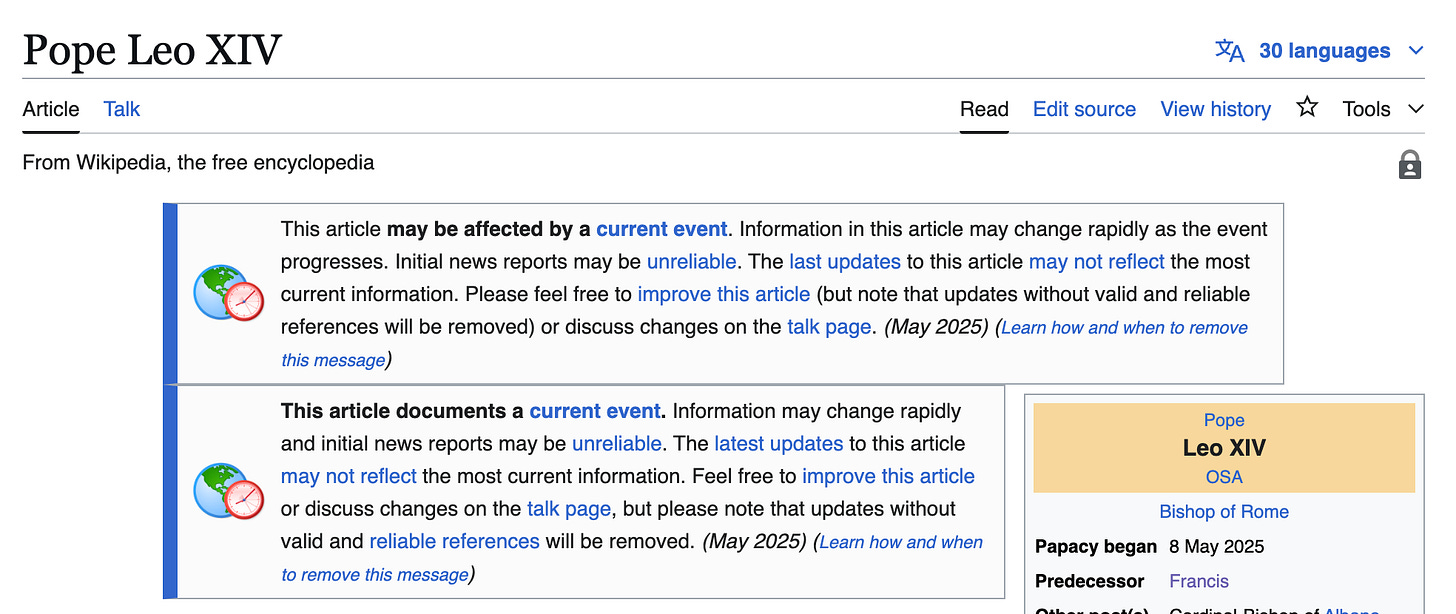Should every Wikipedia article include a reminder of its fallibility?
This is something I've been thinking about a lot.
I think about Wikipedia every day. That’s a big part of why I started this newsletter. It’s a special interest of mine and I want to share my obsession with the world, while also helping people better understand what Wikipedia is, who edits it and how one can start editing it.
Since starting this newsletter, I’ve published eleven posts. Nine of those are still live. (I unpublished two of them, for reasons that I don’t want to get into until there is enough distance that I only see the humor in a bizarre, semi-frightening situation.) While my original goal for this newsletter was something along the lines of “help people understand Wikipedia better,” I’ve increasingly realized that I am frequently mistaken by readers and commenters as a blind Wikipedia defender.
Here’s one of the weirder comments I’ve gotten lately, in response to I edited Pope Leo XIV's Wikipedia article to say he was a Cubs fan.
I’m glad I screenshotted it, because the commenter quickly deleted their comment as soon as I responded something to the tune of “I agree about the fallibility and your point about Chicago makes no sense.” Because they deleted their comment, mine disappeared with it. (A disappointing Substack function right there, but whatever.)
There has been a lot of news about Wikipedia lately. Much of it negative. And this is what has me wondering if Wikipedia needs to better broadcast its purpose and its flaws.
Sure, the Wikipedia page about Wikipedia states:
Wikipedia[b] is a free online encyclopedia, written and maintained by a community of volunteers, known as Wikipedians, through open collaboration and the wiki software MediaWiki. Founded by Jimmy Wales and Larry Sanger on January 15, 2001, Wikipedia has been hosted since 2003 by the Wikimedia Foundation, an American nonprofit organization funded mainly by donations from readers.[2] Wikipedia is the largest and most-read reference work in history.[3][4]
But that’s only relevant if you’re the kind of weirdo who reads the Wikipedia article about Wikipedia. Which many people are not.
Plus, I don’t know if that emphasizes the things that need to be better understood, specifically:
Wikipedia is ever evolving
It’s edited and maintained by volunteers
It’s a nonprofit.
When there is some kind of a banner across Wikipedia, it’s usually a plea for donations. Which, sure, fine, I get, even if I don’t personally donate much.
Right now, here’s the banner I’m seeing on certain pages:
Sure, when a page is super flawed or under construction or needing serious work, you’ll see a message up at the top. Sometimes more than one. Sometimes it looks as chaotic as this one for Pope Leo XIV last week:
But what if there was a message, somewhere on every page? Would that get some of the critics to calm down? Would that raise more awareness of the fragility and ever-evolving nature of this enormous, wildly misunderstood website?
Something like:
Thank you for reading Wikipedia. You are invited to become a Wikipedia editor, like every visitor to this site. Please remember that Wikipedia is an ever-evolving, volunteer-maintained project owned and operated by a nonprofit organization.
I don’t know the answer. I’m sure there are lots of reasons this is a bad idea. But could this calm the critics down? Could it spread awareness of Wikipedia’s true nature?
Anyway, that’s the idea. Tell me why I’m wrong in the comments.







I've been thinking about this too, but I haven't found much to say. Wikipedia seems stuck in a reputational rut that its current community won't find its way out of, but maybe just staying in the rut is enough.